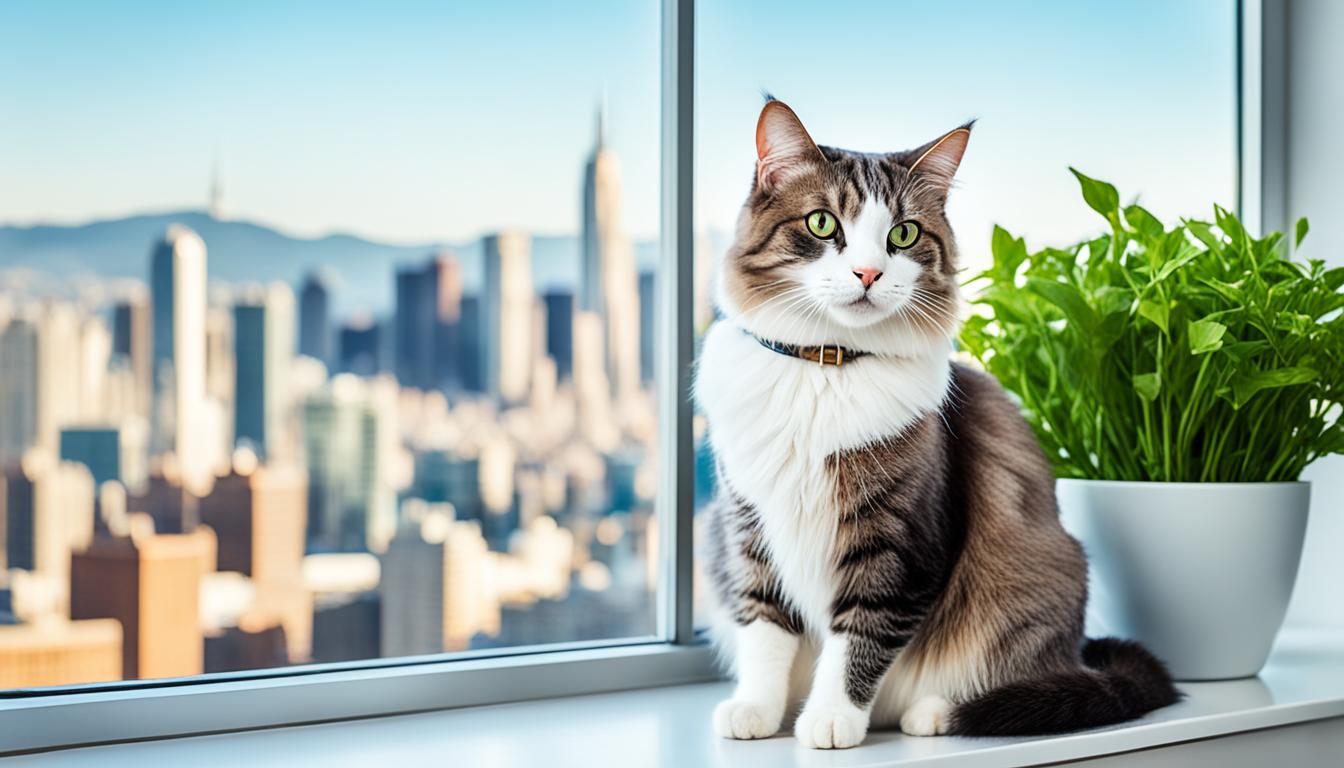
Mark Twain once said, “The best way to cheer yourself is to try to cheer someone else up.” This idea is very true for pet owners. Taking care of your cat’s health is a big responsibility. It makes your life happier and helps your cat live a better life.
By following important health tips, you can make your cat healthier and live longer. In this article, we will talk about how to keep your cat healthy. We’ll cover things like regular vet visits, good food and water, and grooming. These steps help spot health problems early and make your cat happy.
Ensuring your cat’s health means making a caring and interesting home for them. This helps them stay well overall.
Key Takeaways
- Regular veterinary care is crucial for maintaining your cat’s health and detecting issues early.
- Observing your cat’s behavior can reveal underlying health problems or stress.
- Feeding a balanced diet, including wet food, supports overall wellness.
- Hydration is vital; consider using cat water fountains to encourage drinking.
- Routine grooming can prevent health issues and keeps your cat looking great.
- Annual vaccinations protect against severe diseases and enhance your cat’s quality of life.
- Understanding your cat’s breed can aid in early detection of potential health concerns.
Understanding the Importance of Cat Health
It’s crucial to know how to keep your cat healthy for their long life and happiness. Taking your cat to the vet regularly from a young age is key. Kittens should visit the vet soon after they come home and get shots every three to four weeks until they’re about 16 weeks old. The rabies vaccine is given between 12 to 16 weeks, making it very important for their health.
Preventive care is also key for your cat’s health. All cats need protection from fleas and ticks, even if they stay indoors. This is true for kittens as young as eight weeks. Keeping them safe from flea-borne illnesses is especially important for kittens and older cats.
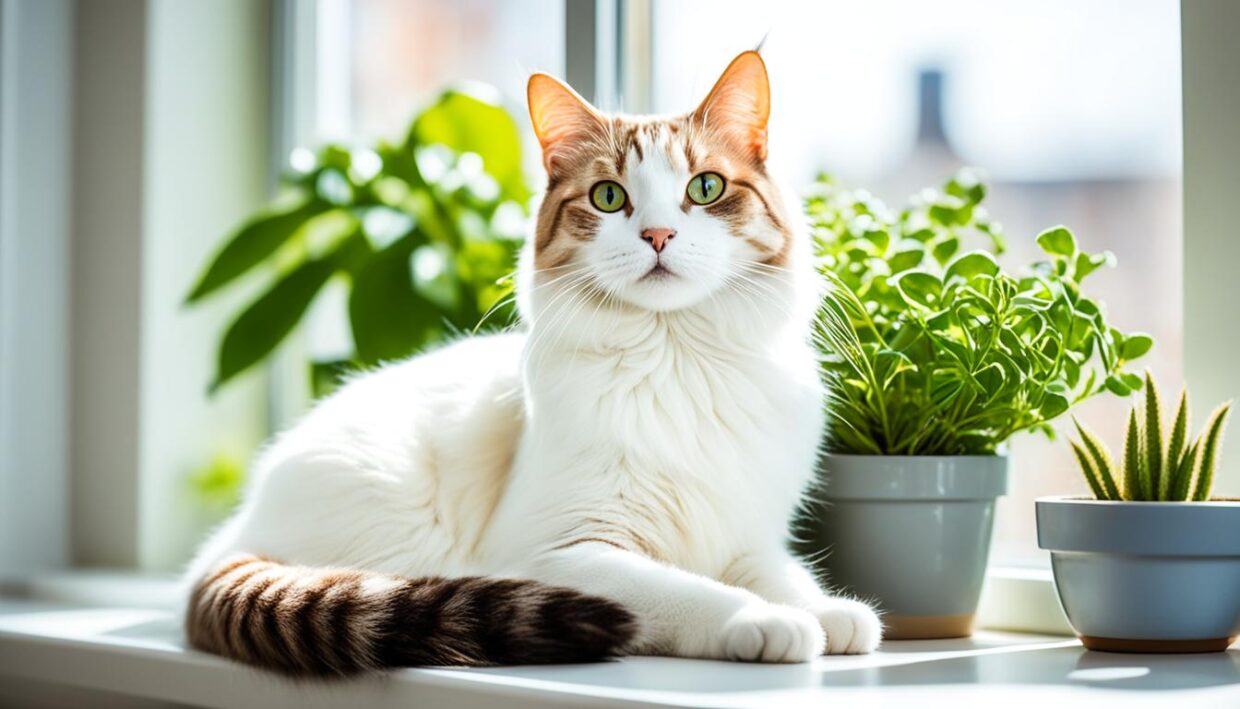
What your cat eats is very important for their health. Cats need certain nutrients found mainly in meat. When changing from kitten to adult food, do it slowly around 10 to 12 months. Paying attention to their diet helps keep them healthy for a long time.
To help your cat stay healthy, make sure they have regular vet visits, preventive treatments, and a balanced diet. These steps improve your cat’s health and strengthen your bond with them.
Regular Veterinary Care for Your Cat
Regular vet visits are key for your cat’s health. Annual check-ups help catch health issues early. For older cats, visits should be more frequent, like every six months or quarterly. Paying attention to your cat’s behavior and health helps you be a better pet owner.
Why Annual Check-Ups are Crucial
Annual check-ups are very important. Vets check on nutrition, lifestyle, and disease prevention. This helps keep your cat happy and healthy. Early detection of health problems means quicker treatment, which can prevent pain or high costs.
Cats age fast compared to humans. So, preventive care is key for their long life and health.
Signs Your Cat May Need to See a Vet
Knowing the signs of illness in cats helps you act fast. If you see any of these symptoms, see your vet right away:
- Decreased appetite or sudden weight loss
- Changes in behavior, such as increased aggression or withdrawal
- Issues with litter box habits, including increased urination or blood in urine
- Persistent coughing, vomiting, or diarrhea
- Excessive grooming or signs of discomfort
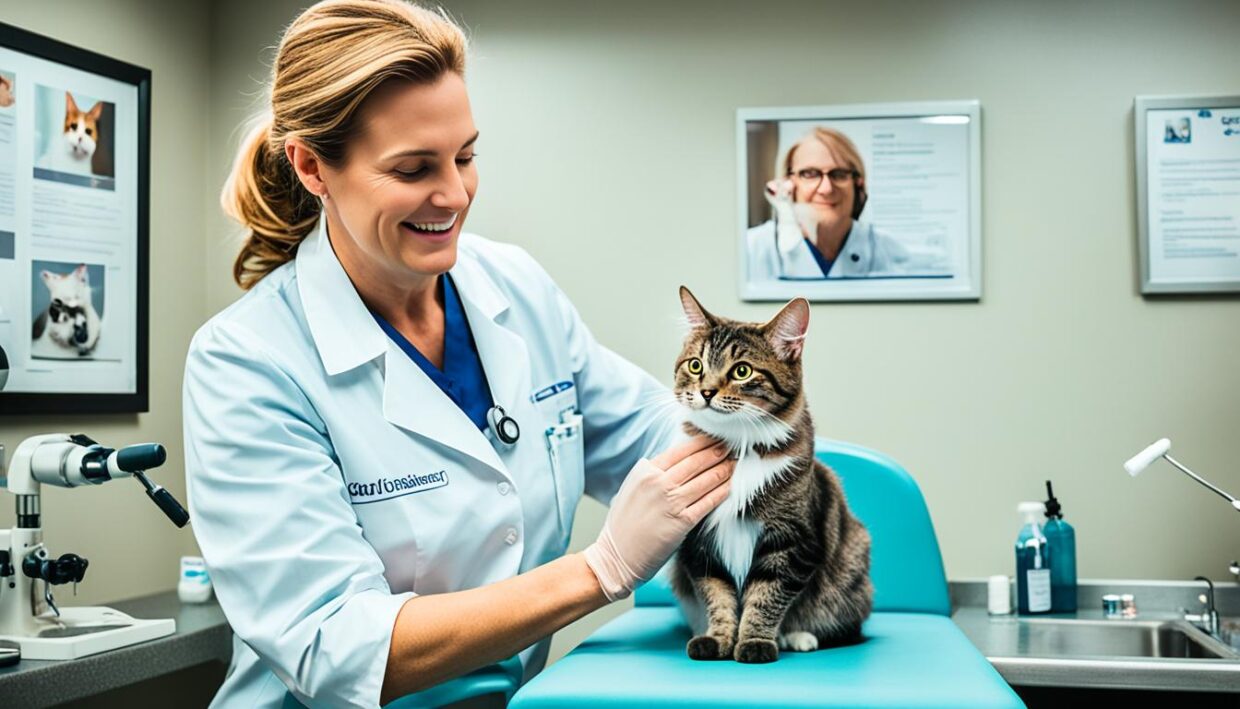
Regular vet care helps spot these signs early. It also deepens your understanding of your cat’s health needs. Being alert lets you work closely with your vet for the best life for your cat.
Feline Nutrition: What to Feed Your Cat
Feeding your cat the right food is key to their health and happiness. They need a diet full of high-quality protein, fats, vitamins, and minerals. Knowing what they need helps them stay healthy and active.
Essential Nutrients for a Healthy Diet
Cats need certain nutrients for good health. Here are the main ones:
- Proteins: These are crucial for muscles and support. Cats do best with animal-based proteins because plant proteins are not complete.
- Fats: These give cats a lot of energy. They should eat 20-40% fat to avoid health problems.
- Vitamins: These help with body functions and immunity. They come in fat-soluble and water-soluble types.
- Water: Cats lose water often, so staying hydrated is important. Wet food helps with this.
Wet Food vs Dry Food: Which is Better?
Many people and vets argue over wet vs dry cat food. Here’s a look at each type:
| Criteria | Wet Food | Dry Food |
|---|---|---|
| Water Content | Up to 80% | Low (about 10%) |
| Protein Quality | Higher protein content on a dry matter basis | Often contains plant-based proteins |
| Vitamins & Nutrients | More naturally occurring nutrients | Heavily processed, may lack essential nutrients |
| Dental Benefits | N/A | Can promote dental health |
| Health Risks | Less likely to contain contaminants | Processed, prone to bacteria |
Dry food is good for teeth but can cause dehydration and other issues. Canned foods are better because they keep cats hydrated and have more protein. Many vets suggest canned food for these reasons.
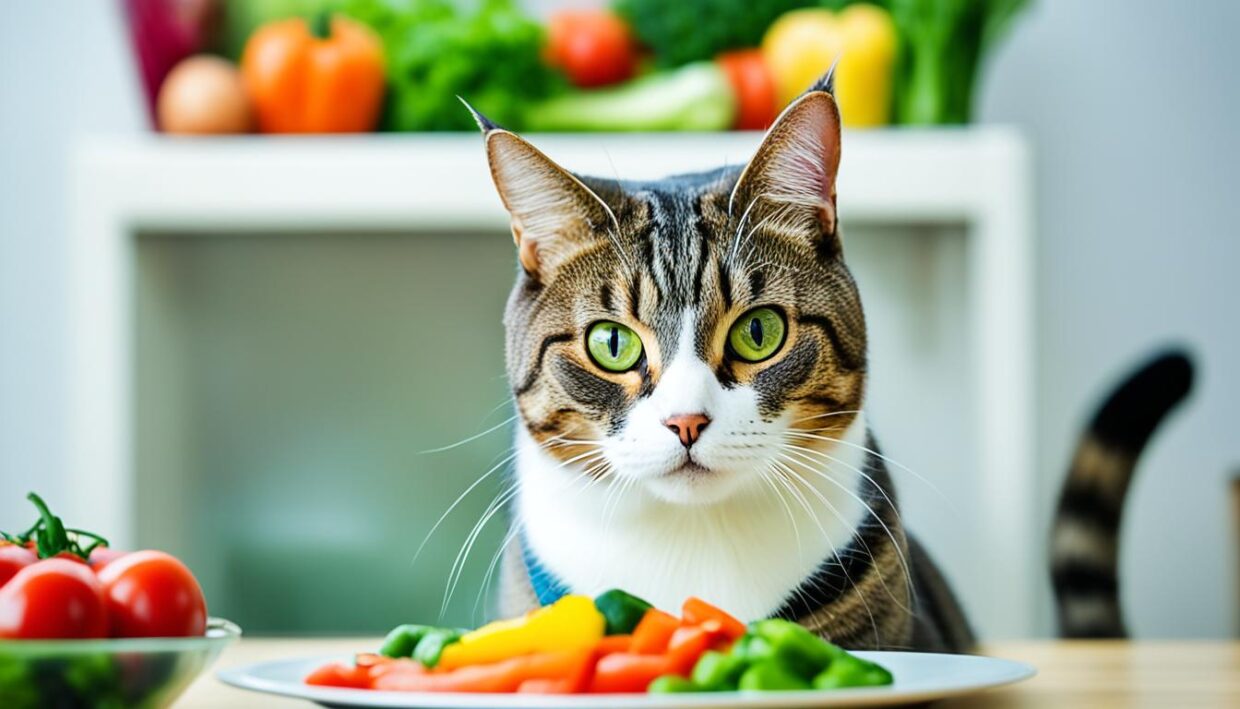
Keeping Your Cat Hydrated: Tips for Success
Keeping your cat hydrated is key for their health. Cats need water differently than other pets. Giving them the right options helps prevent dehydration and other health problems. Here are some tips to help your cat drink enough water.
Understanding Your Cat’s Hydration Needs
Drinking enough water is crucial for cats. Look out for signs of dehydration like being very tired, panting, or dry gums. Watch your cat closely, especially when it’s hot or after they’ve been outside. Here are ways to get your cat to drink more:
- Choose wet cat food, which has up to 80% water.
- Try flavored liquids like bone broth to make them more appealing.
- Give them high-water treats, such as squeezable puree cat treats.
Using Cat Water Fountains
Many cats like fresh, moving water better than still water. A cat water fountain can make them drink more. These fountains also keep the water clean and cool. Switching to wet food can also help your cat drink more. Make sure your cat always has access to water.
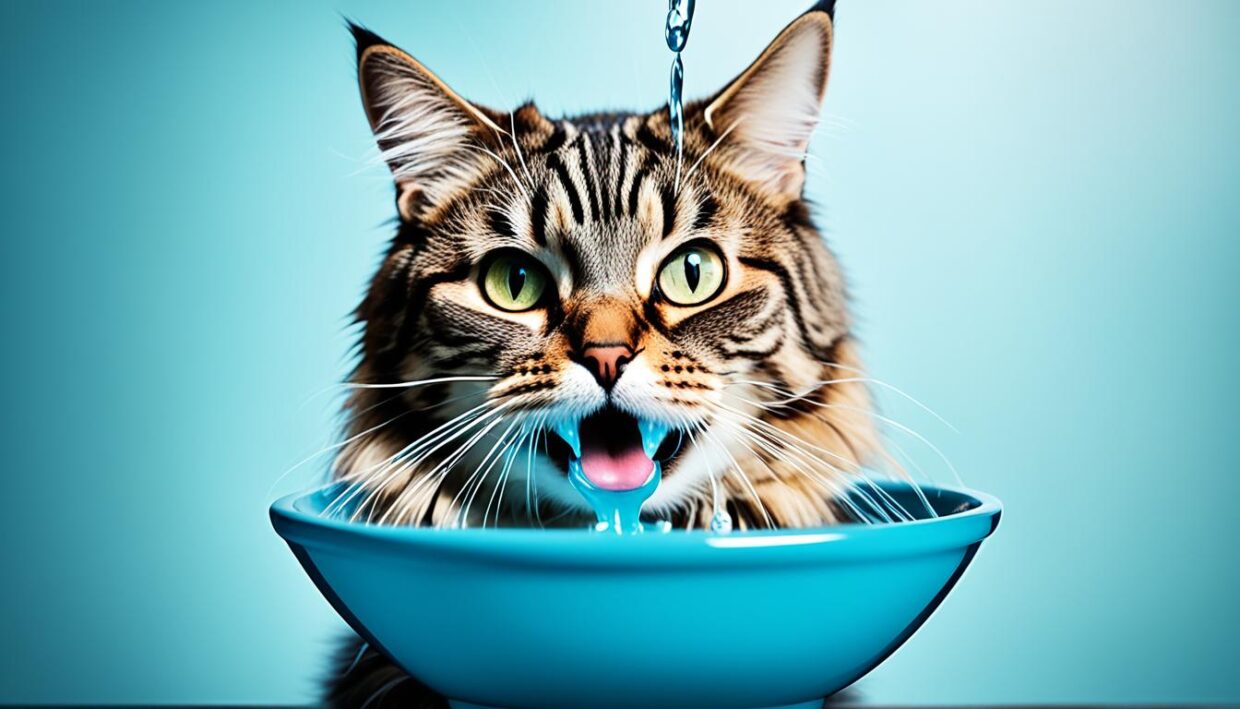
| Hydration Method | Benefits |
|---|---|
| Wet Cat Food | Increases hydration due to high water content. |
| Cat Water Fountains | Encourages drinking through fresh, flowing water. |
| Flavored Liquids | Attracts cats to drink more, supporting hydration. |
| High-Water Treats | Provides additional hydration while offering a snack. |
Watching how much your cat drinks can stop serious health problems. If your cat seems very dehydrated, see a vet. A well-hydrated cat is a happy and healthy cat.
The Role of Cat Exercise in Maintaining Health
Cat exercise is key to keeping your feline friend healthy and at a good weight. It helps prevent obesity and related health issues. Playing with your cat keeps them fit and sharp mentally. Knowing how to make playtime fun can benefit both you and your cat.
Effective Ways to Promote Playtime
To get your cat moving, try different play methods that fit their needs. Aim for 20 to 60 minutes of play each day, split into 15-minute sessions. Here are some tips for fun playtime:
- Introduce various engaging toys such as motorized mice, feather toys, and laser pointers.
- Use puzzle toys to stimulate your cat’s mind.
- Incorporate simple household items like cardboard boxes and paper bags to spark curiosity.
- Schedule play based on your cat’s age and health, especially if they have conditions like arthritis or heart disease.
- Start with gentle exercises for overweight or elderly cats to prevent injury.
Best Toys for Active Cats
The right toys can make a big difference in your cat’s exercise routine. Here are the top toys for boosting activity:
| Toy Type | Benefits |
|---|---|
| Motorized Mice | Simulates prey movement, encouraging chasing and pouncing. |
| Feather Toys | Stimulates hunting instincts, ideal for engaging play. |
| Laser Pointers | Provides fast-paced exercise, promoting agility and alertness. |
| Puzzle Toys | Challenges the mind while rewarding with treats, perfect for longer engagement. |
| Exploration Toys (like boxes and bags) | Encourages curiosity and exercise as cats navigate through them. |
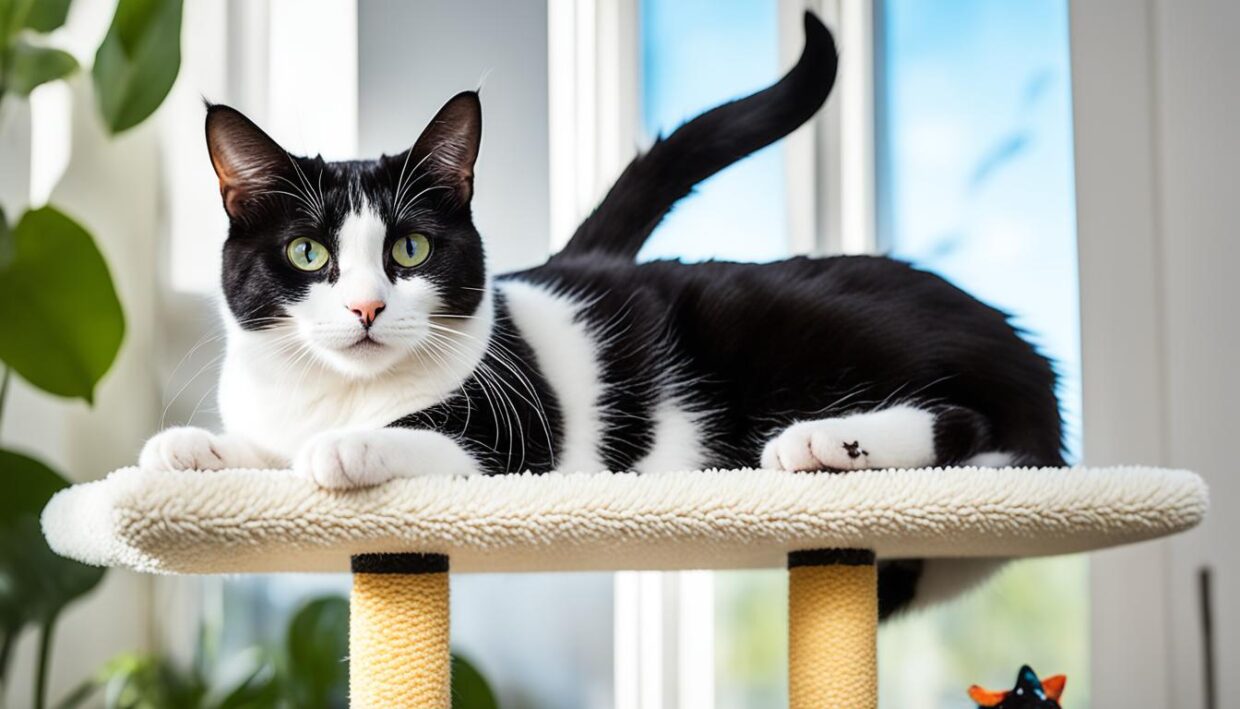
Importance of Grooming Your Cat
Regular grooming has many grooming benefits for a cat’s health. It keeps their coat looking good and helps with cat coat care. Grooming lets owners check for skin problems, lumps, or health changes easily.
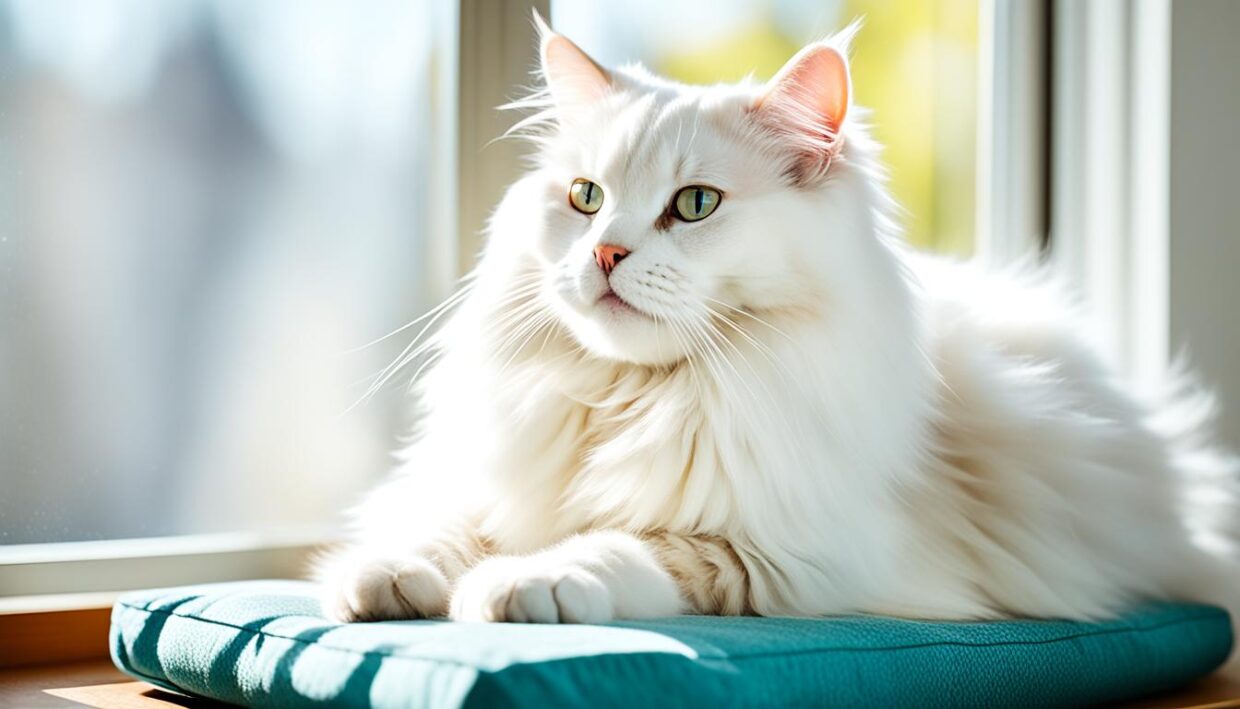
- Helps to improve circulation in the skin, promoting healthy hair growth.
- Reduces stress levels in cats, as grooming increases oxytocin levels and can alleviate anxiety-related behaviors.
- Removes dirt, debris, and even parasites, ensuring the skin remains healthy.
- Decreases shedding of fur, keeping the home cleaner and minimizing hairballs.
- Creates opportunities for bonding between the owner and the cat, enhancing emotional well-being.
For good cat coat care, knowing what different breeds need is key. Long-haired cats need daily grooming to avoid tangles. Short-haired cats do well with weekly grooming. Owners should use tools like dematting combs, slicker brushes, and grooming mitts to help.
Regular grooming does more than just keep fur tidy. It helps owners check on their cat’s health and diet. It matches how cats naturally spend time grooming themselves. Paying attention to a cat’s grooming likes can make the experience less stressful for both the cat and the owner.
Preventing Cat Diseases Through Vaccinations
Vaccines are key to keeping cats healthy by protecting them from serious illnesses. It’s vital to understand how important vaccines are. They help keep cats safe, no matter their age or lifestyle.
Regular visits to the vet make sure your cat gets the vaccines they need. This keeps them healthy and happy.
Core Vaccinations Every Cat Should Receive
Knowing which shots your cat needs is crucial for their health. Here are the core vaccinations every cat should get:
- Rabies
- Feline Panleukopenia (feline distemper)
- Feline Viral Rhinotracheitis
- Feline Calicivirus
Kittens need four FVRCP shots starting at six to eight weeks old. They might need more shots every year or every three years, depending on their age. It’s important to test for Feline Leukemia Virus (FeLV) before vaccinating, especially for outdoor cats or those at risk.
The Association of Feline Practitioners suggests FeLV vaccines for all cats up to 2 years old.
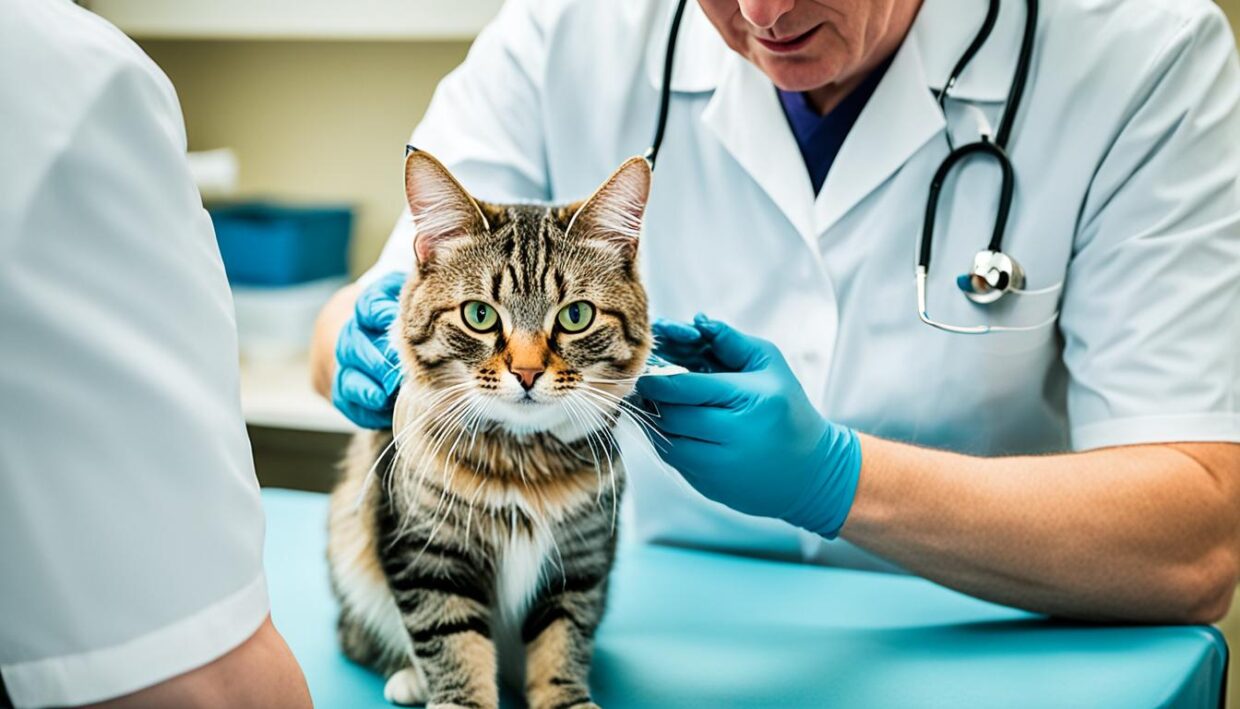
Understanding Vaccination Schedules
Having a good vaccination schedule is key to keeping cats healthy. Kittens start losing their mother’s immunity around six weeks old. So, they need shots every three to four weeks until they’re about 16 weeks old.
Adult cats usually need shots every year or every three years, depending on the vaccine. Even indoor cats can be at risk, so sticking to a vaccination schedule is best. It’s important to keep up with vet visits to stay on top of vaccinations.
Recognizing Common Cat Behavioral Changes
Knowing your cat’s behavior is key to understanding their health. Cats often hide when they’re not feeling well. Spotting changes in their routine or habits is important. It can mean they’re stressed or have a health problem.
Seeing these changes early can lead to quicker vet care. This helps keep your cat happy and healthy.
Indicators of Potential Health Problems
Cats are usually clean animals, but changes in their habits can mean they’re sick. For example, about 10% of cats have trouble with bathroom habits at some point. This could be due to:
- Urinary tract infections
- Kidney and thyroid disease
- Diabetes
- Digestive problems
Keeping the litter box clean is crucial. Cats won’t use a dirty one. Experts say have one litter box per cat, plus an extra, for cleanliness. And, place them in quiet spots for your cat’s comfort.
Scratching is another sign of behavior change. About 84% of cats scratch on household items. Giving them scratching posts made of sisal or cardboard can help.
The Impact of Stress on Cat Behavior
Stress can really change a cat’s behavior. They might become aggressive, hide, or change how they groom. Dusk and dawn are when cats are usually most active. But, changes in their routine can make them anxious.
Doing fun activities with your cat can help reduce stress. It keeps them busy and sharp. It’s important to keep stress away and make a calm place for your cat.
Some cats, like Siamese cats, might make more noise when stressed. Knowing what’s normal for your cat can help you spot problems early. Watching your cat every day is key to catching health issues fast.
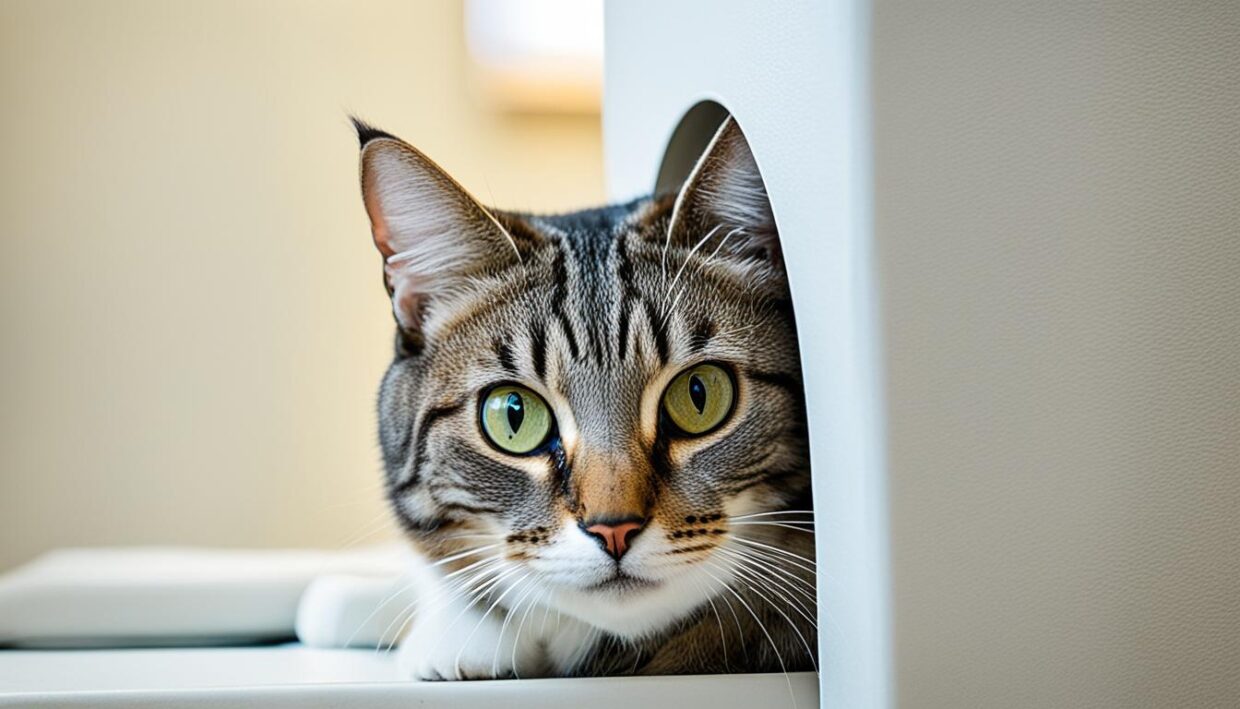
The Importance of Cat Dental Care
Dental health is key to a cat’s overall health, but it’s often overlooked. Many cat owners don’t know how crucial it is to keep their cat’s mouth clean. About 70-85% of pets over 2 years old have dental disease. This shows how important it is to be aware and prevent these issues.
Common Dental Issues in Cats
Several common cat dental issues can happen, including:
- Tartar accumulation
- Gingivitis
- Periodontal disease
- Tooth resorption
- Traumatic tooth fractures
These problems can be very painful and really affect a cat’s life. Untreated gum disease can let bacteria get into the bloodstream. This can lead to serious health problems, like heart, liver, and kidney issues. Cats often hide their pain, making it hard to spot and treat these problems early.
How to Maintain Your Cat’s Oral Hygiene
To keep your cat’s mouth healthy, you need to do several things:
- Brushing: Brush your cat’s teeth daily or at least twice a week. This helps stop plaque and tartar from building up.
- Professional Cleanings: Cats need regular cleanings from a vet every 1 to 2 years, starting from age 2 or 3.
- Dental Treats and Foods: Special dental foods and treats can help control plaque and make their breath fresh.
- Veterinary Consultation: Talk to your vet for advice on dental care, including the best dental products for your cat.
Good dental care has many benefits for cats, like more energy, better behavior, and a longer life. With regular care and check-ups, you can stop common cat dental issues before they get worse. This way, your cat can live a happy, healthy life.
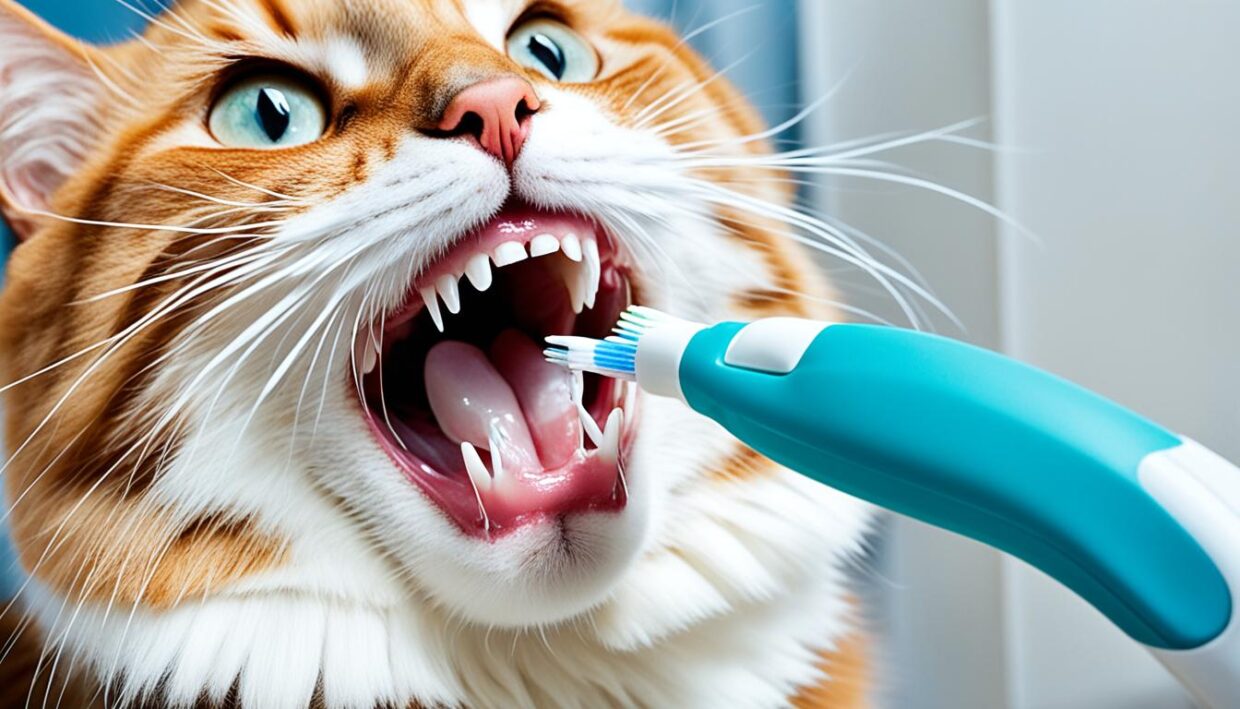
| Dental Issue | Symptoms | Treatment |
|---|---|---|
| Tartar Accumulation | Hard deposits on teeth, bad breath | Professional cleaning, regular brushing |
| Gingivitis | Red, swollen gums, bleeding | Dental cleaning, improved oral hygiene |
| Periodontal Disease | Loose teeth, persistent bad breath | Advanced dental cleaning, possible extractions |
| Tooth Resorption | Painful chewing, swelling | Extraction of affected teeth |
| Traumatic Tooth Fracture | Pain, difficulty eating, swelling | Root canal or extraction |
Cat Supplements: When Are They Necessary?
It’s important to know when your cat needs supplements to stay healthy. Cats go through different life stages, and some need extra help. Veterinary advice on supplements shows how important it is to give them the right food at each stage.
Types of Cat Supplements Available
There are many supplement types for cats for different health needs. Here are some common ones:
- Joint Supplements: These have Glucosamine, Chondroitin, and Omega-3 fatty acids to keep joints healthy.
- Skin and Coat Supplements: With Omega-3 and Omega-6 fatty acids, they help keep the coat shiny.
- Digestive Supplements: Probiotics keep the gut healthy, and hairball control formulas help with hairballs.
- Immune Support Supplements: L-lysine and antioxidants like vitamin E boost the immune system.
- Stress and Anxiety Supplements: L-tryptophan and synthetic pheromones can calm anxious cats.
- Senior Supplements: These have glucosamine, omega-3 fatty acids, and probiotics for older cats.
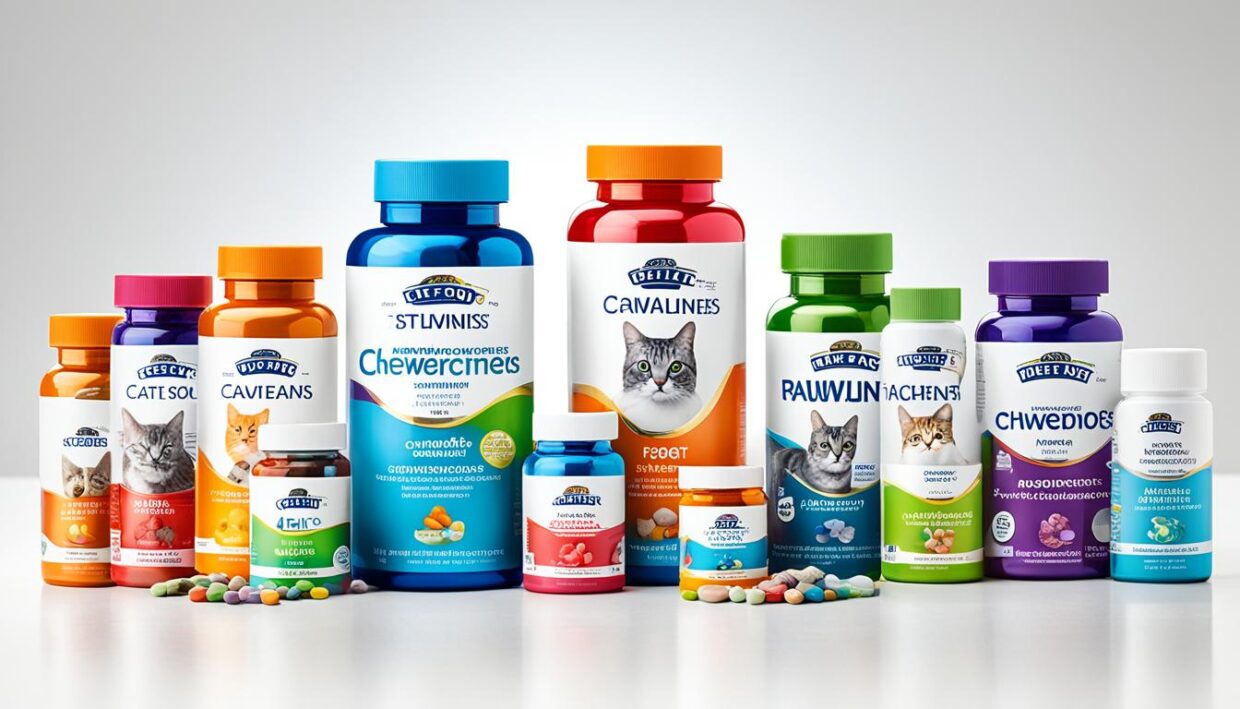
Discussing Supplements with Your Veterinarian
Always talk to your vet before giving your cat new supplements. They can give you veterinary advice on supplements based on your cat’s health. Since supplements aren’t regulated like human ones, a vet’s advice can prevent problems like overdose or toxicity. The National Animal Supplement Council (NASC) supports quality standards for safe supplements.
With so many supplements out there, talking to your vet helps pick the best ones for your cat’s diet.
Flea and Parasite Prevention for Cats
Cat fleas and ticks are big health risks for cats. It’s important to know about these dangers to protect your pets. Fleas cause allergic reactions and intense itching. Ticks can spread diseases. Knowing these risks helps cat owners protect their pets.
Understanding the Risks Posed by Fleas and Ticks
Fleas are more than just annoying; they can cause serious health problems like anemia and skin infections. They multiply fast, so a small infestation can quickly get worse. Ticks can attach to your cat and spread diseases like Lyme disease and Ehrlichiosis. It’s important to watch for these parasites to keep your cat healthy.
Effective Prevention Methods
To prevent fleas on cats, start with vet-approved treatments. Here are some strategies to consider:
- Year-Round Prevention: Use treatments like Revolution Plus or Bravecto to protect against fleas, ticks, and other parasites.
- Regular Check-Ups: Have your cat’s feces checked 2 to 4 times a year, especially if they’re not on a prevention program.
- Maintain Clean Living Environments: Vacuum and wash your cat’s bedding often to get rid of eggs and larvae.
- Prompt Treatment: Treat your cat right away if you find fleas or ticks to stop more from coming.
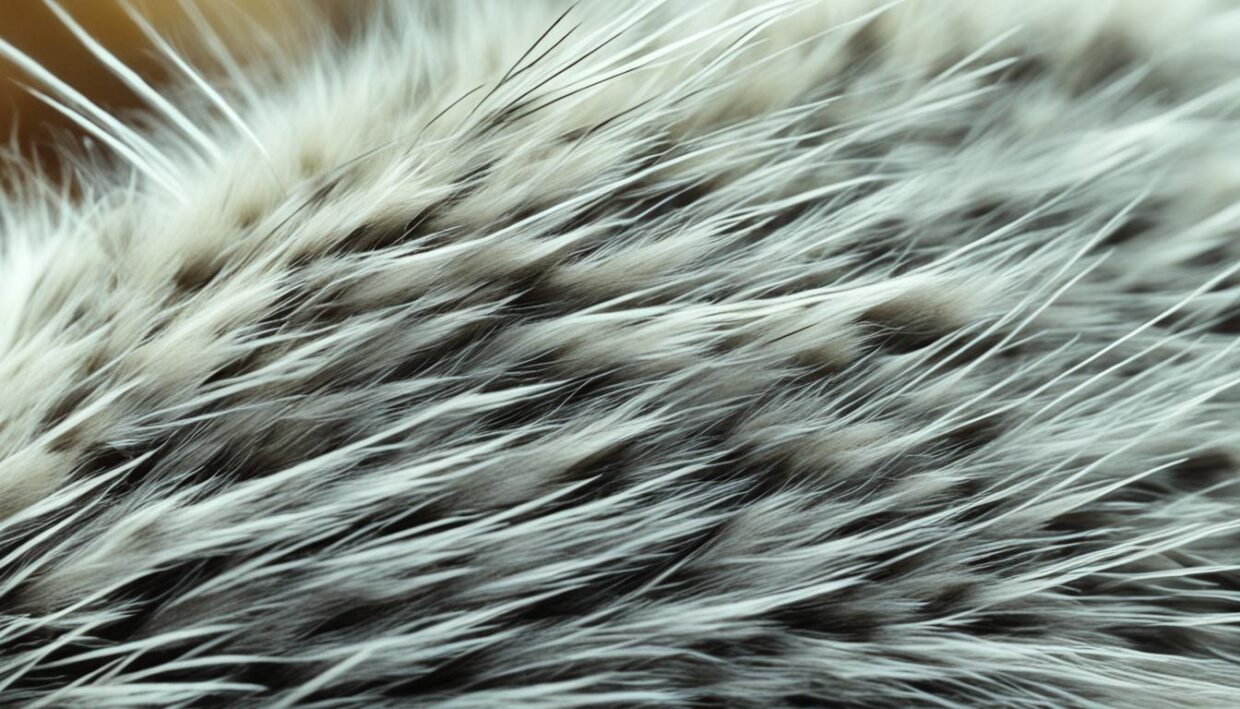
Controlling fleas leads to healthier, happier cats. Being proactive not only keeps your pet safe but also makes your home more comfortable for you and your cat.
Creating a Cat-Friendly Environment
A cat-friendly environment is key to your cat’s health and happiness. It includes a few important things that help them feel safe and happy. These elements make a safe home for cats, supporting their natural behaviors and giving them comfort.
Essential Elements of a Safe Home for Cats
First, make a space that feels secure for your cat. This means:
- Providing a cozy, enclosed sleeping area with soft bedding and familiar smells.
- Installing multiple litter boxes, one more than the number of cats you have.
- Choosing litter boxes that are the right size and deep enough for your cat’s comfort.
- Creating elevated spaces for your cat to watch their surroundings safely.
When sharing resources with other cats, think about each cat’s personality to keep peace in the house. These steps help make a safe home for cats where they feel secure.
Enrichment Activities to Keep Cats Stimulated
Enrichment activities are key for your cat’s mind and body. Here are some ideas:
- Scratching posts to meet their natural scratching needs.
- Puzzle feeders that make eating fun and active.
- Interactive toys for bonding and play, building emotional ties.
These activities fight boredom and stress, lowering the chance of bad behaviors. They make your cat’s life better, making them happier and less anxious.
| Essential Elements | Benefits for Cats |
|---|---|
| Cozy Sleeping Areas | Provides security and comfort for rest |
| Multiple Litter Boxes | Reduces territorial stress and promotes cleanliness |
| Elevated Spaces | Offers vantage points for observing their territory |
| Engaging Toys | Enhances mental stimulation and physical activity |
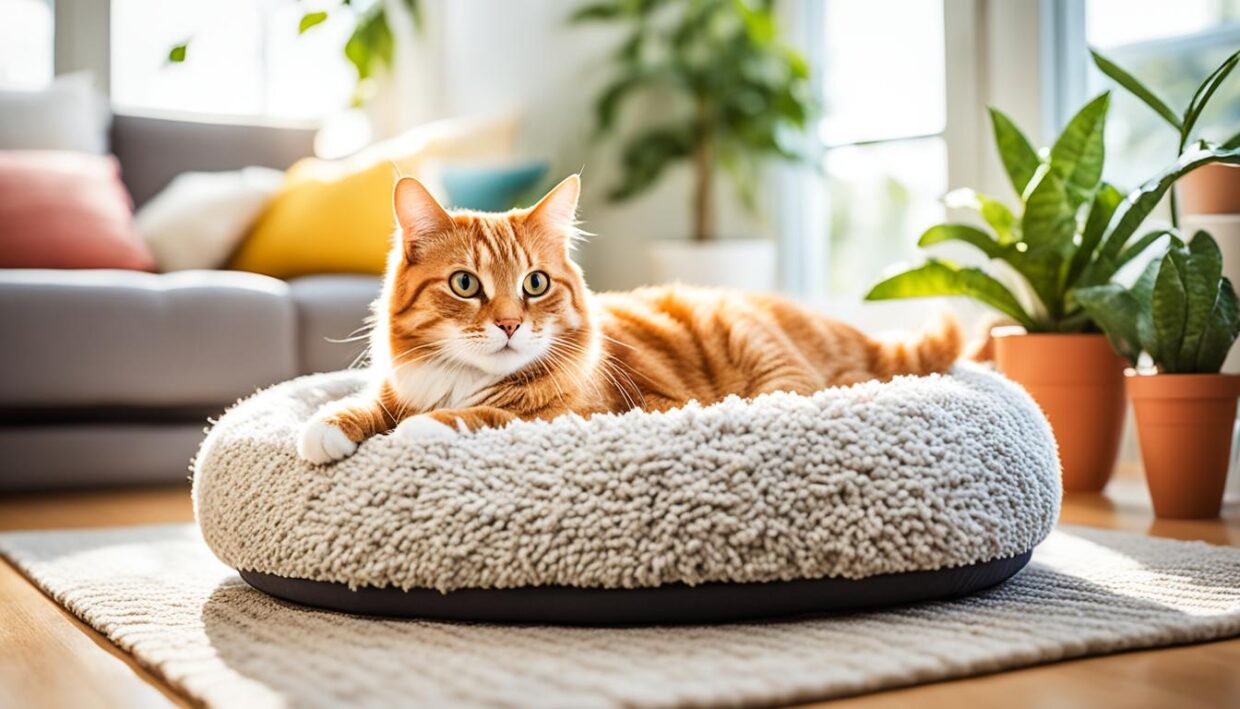
Creating a cat-friendly environment is very good for them. It makes a safe home and keeps them busy with fun activities. Thinking about their space can really cut down on stress and make their life better.
Grooming Your Cat: A Key to Their Health
Looking after your cat’s health is more than just feeding and vet visits. Grooming is crucial, helping in many ways that boost overall health. It keeps the coat shiny and lets owners check for health signs.
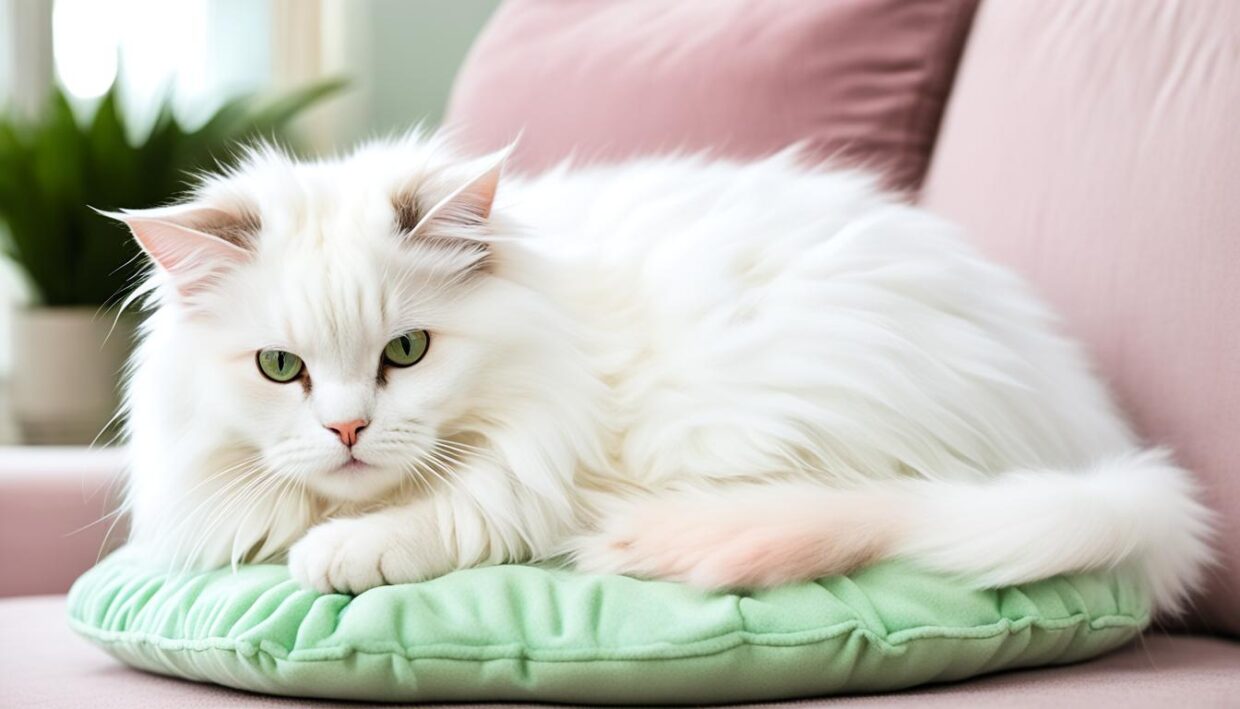
For cats with long hair, daily brushing stops mats. Short-haired cats need brushing once a week. Elderly cats might need more grooming help as they age. These tips help with shedding and keep the coat healthy. Regular grooming also lowers the chance of hairballs, which can cause stomach problems.
Grooming is key for skin health and spotting issues like lumps or fleas. It’s good for both cats and owners, reducing stress. In colder areas, knowing about shedding helps with grooming needs.
- Long-haired cats require daily brushing.
- Short-haired cats benefit from weekly sessions.
- Elderly cats need extra grooming assistance.
- Grooming improves coat condition and reduces shedding.
- Frequent grooming prevents hairballs and related intestinal problems.
- Skin health improves with regular grooming practices.
- Grooming assists in identifying health issues early on.
- It strengthens the bond between cats and their owners.
Regular grooming can spot health problems early, leading to quick treatment. Using the right tools, like a flea comb, is important for thorough grooming. A good diet also helps with skin and coat health, as bad nutrition can make the coat dull and increase shedding.
In summary, grooming keeps the coat healthy, helps bonding, and warns of health issues. It’s a key part of caring for your cat.
Conclusion
Being a responsible cat owner means focusing on your cat’s wellness. This includes proper nutrition, regular vet visits, exercise, and watching for behavior changes. By doing these things, you help your cat live a long, happy life.
Regular vet check-ups are key to keeping your cat healthy. These visits can catch health problems early. A balanced diet is also important for your cat’s growth and health. Plus, playing with your cat every day keeps them physically and mentally fit.
Pay attention to your cat’s needs to avoid stress and keep them happy. By following these steps, you help your cat stay healthy and happy. Every small action you take now can make a big difference in your cat’s future. Your effort in caring for their well-being strengthens your bond and brings joy to both of you.















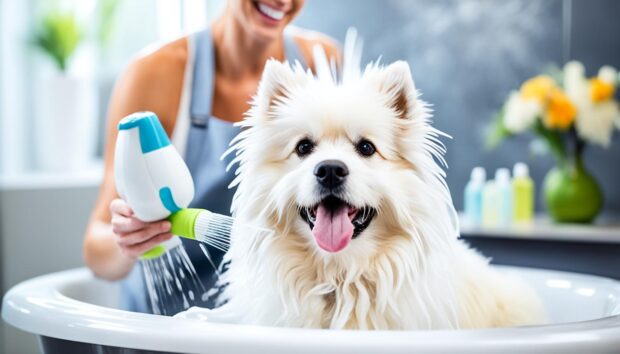
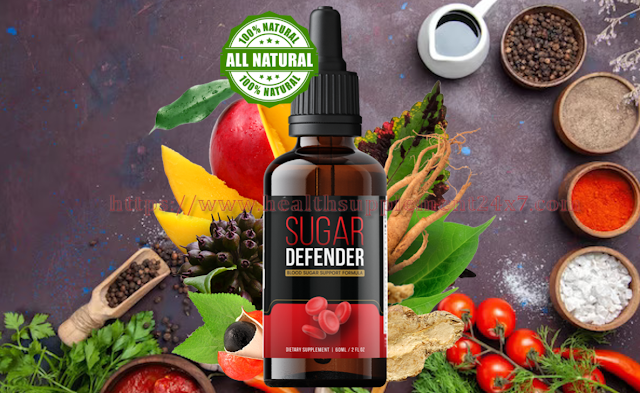




Be the first to leave a comment